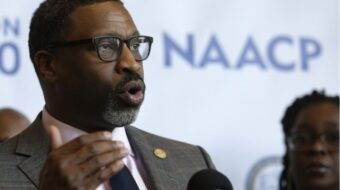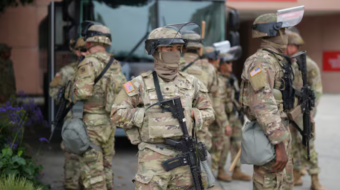
From Truthout: View article at original source.
Ferguson police officer Darren Wilson never went to trial for killing Mike Brown, but he had one of the best attorneys anyone in his situation could have had. St. Louis prosecutor Robert McCulloch not only helped Wilson in the legal proceedings but proved himself a skilled manager of public relations, which in a case that had this much national attention was an important part of making sure that Wilson would never be charged with a crime.
McCulloch’s first successful public relations move was to create the impression for many people that it was the grand jury who decided not to indict Wilson. In fact it was McCulloch who made this decision; as in the case of nearly all grand juries, the prosecutor decides what to present to the grand jury and how to present it, in order to get the result that he or she wants. In an unusual move, Wilson was one of the first witnesses and testified for four hours, which helped set the narrative as against other, conflicting accounts.
As the New York Times noted, “the prosecutors rarely asked skeptical questions of Officer Wilson and frequently let testimony supporting him pass unchallenged, while boring in on the statements of witnesses whose accounts conflicted with the officer’s.”
Of course, the grand jury proceeding is not a trial, and its purpose is not to determine the guilt or innocence of anyone. It is to decide whether there is probable cause to charge someone, in this case Darren Wilson, with a crime. This is a low standard, and on the face of it, wouldn’t be hard to meet in a case like this.
Sixteen of the 18 witnesses who answered the question said that Mike Brown had his hands up when he was shot. There were conflicting accounts, but those are the kinds of things that get sorted out in a trial.
As for Darren Wilson’s story, it was not only contradicted by numerous witnesses, it is also not an easy story to believe. To accept it, you have to believe that Mike Brown, who ran away from the police car to avoid being killed, suddenly turned around and embarked on a suicide mission. Like the suicide bombers that we read about every week in Afghanistan or Iraq, he had decided to die, charging toward a hail of bullets even after some had already wounded him. As far as we know, there is nothing in his past that indicates suicidal impulses or even mental illness, nor did he carry the explosives that suicide attackers normally have to at least cause damage to their enemies as they sacrifice their lives for a deeply held cause.
McCulloch’s presentation of the grand jury decision was also a skilled public relations effort. It probably convinced millions of people who are not familiar with the U.S. legal system that the grand jury proceeding was some kind of trial. Whatever one thinks of the idea of letting a group of ordinary citizens determine the guilt or innocence of one of their peers, at least in a criminal trial it is done through an adversarial process, with numerous procedures designed to help the jury get to the facts of the matter. This was nothing of the sort, and the jury – having already worked with McCulloch – was pre-disposed to get the result he wanted. What he wanted was no indictment, and all he needed was four of the 12 jurors to vote for that; nine of them were white.
St. Louis attorney Jerryl T. Christmas noted that this grand jury was a “holdover” jury (staying beyond its normal term) that had “already developed a close relationship with the prosecutor’s office and also understands that this case has been presented differently than previous cases. They realize that the office normally gives them a charge to indict on, and never before have they been told to figure it out themselves.”
Many observers have pointed to McCulloch’s family background, his father having been a police officer and killed by a black man, etc., as evidence of bias. But this was not necessary. He works with the police every day and needs their co-operation. If he had gotten an indictment against Darren Wilson, he would have been seen by these police as literally a traitor, like a soldier who goes over to the side of the enemy. That is why he would not consider recusing himself from the case, which would similarly have been seen as an act of betrayal. Not to mention what it would do to any political ambitions he might have.
McCulloch was criticized for announcing the verdict at night, thus making rioting more likely. But this was a good move for him and for his client too; the news coverage for the rest of the evening was mostly about burning and looting, and not about the jury’s decision.
Wilson’s interview with George Stephanopoulos was also well-executed and helped establish his account of events as the dominant media narrative. It was obviously exaggerated, as when he said he felt “like a five-year-old holding onto Hulk Hogan,” when grappling with Brown in his car. Not to mention that Brown looked like a “demon.” Wilson was the same height as Brown, and at 215 pounds and with police training, not exactly helpless. When asked why he went for his gun instead of a non-lethal taser, he said that he didn’t carry a taser because it was bulky and uncomfortable.
The right-wing media has run with McCulloch’s and Wilson’s public relations efforts, but even the more centrist media seems to have been influenced by it. For example, the New York Times reported that “Officer Wilson testified, and both bruises and DNA evidence indicate, that Mr. Brown struck him and tried to wrest his gun away early in their encounter.” But while the DNA evidence and bruises could support the account of a tussle between the two when Wilson was still in his car, there is no physical evidence supporting Wilson’s allegation that Brown “tried to wrest his gun away.”
This claim was repeated as fact on TV talk shows.
As another example of how badly the whole case was handled, one can look at the original instructions given to the grand jury. As MSNBC’s Lawrence O’Donnell pointed out, the jurors were at first given a 1979 Missouri statute that said that a police officer was allowed to use whatever force he or she “reasonably believes is immediately necessary to effect the arrest.” This law was ruled unconstitutional by the U.S. Supreme Court in 1985, and rightly so, since it effectively gave police a “license to kill” any fleeing suspected felon, whether such person was a threat to anyone or not. Three months later, the assistant prosecutor withdrew the unconstitutional statute, but it’s not clear how much the jury understood the change of instruction.
The original instruction coincides with the way that the police and their advocates – including McCulloch – see this case. In their view, Brown was responsible for his own death, and the details don’t matter so much. Wilson included the obligatory “reaching into his waistband” by Brown – has there ever been a cop that shot an unarmed person who didn’t somehow look like he was reaching for a weapon? – but it was hardly necessary. The case was decided when McCulloch refused to recuse himself and Missouri governor Jay Nixon decided not to appoint a special prosecutor.
If it wasn’t for the huge public outcry and protests in cities across the country, Mike Brown would have been just another one of a long list of young black men shot dead by a police officer with impunity. But this case is not going away that easily, even if McCulloch has successfully avoided bringing criminal charges. There are tens of millions of Americans – of all races — who can see that this process was a farce.
Mark Weisbrot is co-director of the Center for Economic and Policy Research, in Washington, D.C. (www.cepr.net ). He is also president of Just Foreign Policy (www.justforeignpolicy.org )
Photo: In this caricature of Bob McCulloch throws his hands up trying to say he has no responsibility in the grand jury proceedings. The artist names his work “Hands Up Don’t Indict.” (DonkeyHotey/Flickr/CC)










